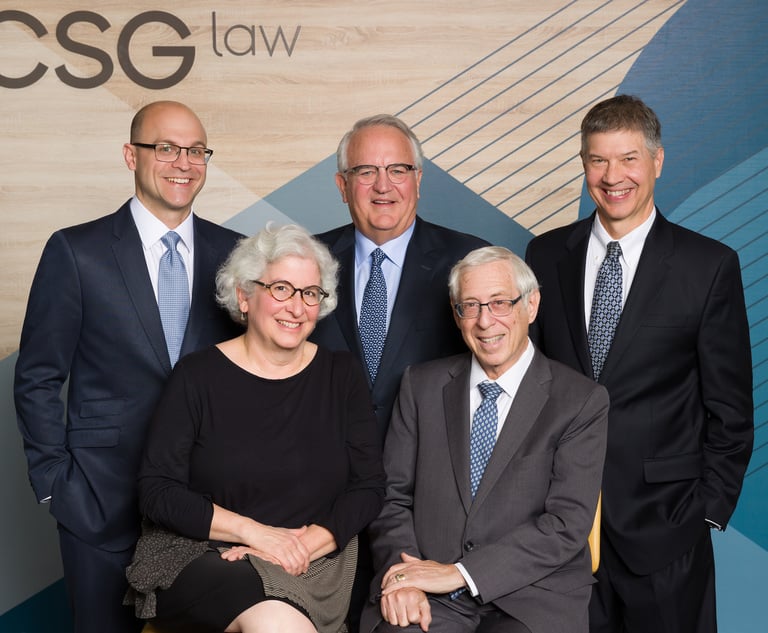BAR REPORT - Court rules in favor of expanded representation in administrative child abuse and neglect hearings
The Appellate Division held that substantiation of a child abuse charge is a consequence of magnitude sufficient to warrant the appointment of counsel for an indigent defendant.
July 08, 2019 at 08:01 AM
4 minute read
Comparing the substantiation of a child abuse and neglect charge that results in a listing on the child abuse registry to a “governmentally-imposed scarlet letter,” the Appellate Division held that indigent parents or guardians facing such a charge are entitled to counsel at both the administrative level and any appeal as of right. The published decision, DCPP v. L.O., reverses the final agency decision and remands the matter back for a new administrative hearing. The New Jersey State Bar Association participated as amicus curiae, arguing that because inclusion on the child abuse registry is confidential and does not trigger the termination of parental rights, listing on the registry is not a “consequence of magnitude” triggering the right to counsel. The association further argued that if the court were to find the right to counsel, the representation should be provided by knowledgeable, experienced counsel through a state-funded source, and not through the random assignment of pro bono counsel. NJSBA Trustee Amy E. Vasquez argued the matter on behalf of the association.
The Appellate Division held that substantiation of a child abuse charge is a consequence of magnitude sufficient to warrant the appointment of counsel for an indigent defendant; the right attaches to administrative proceedings commenced when the government agency provides the parent or guardian with written notice an investigation has substantiated abuse or neglect, as well as when a final agency decision has been appealed to the Appellate Division as of right and further includes free transcripts; and, until such time as the Legislature acts, the right to counsel shall be enforced by courts and agencies through pro bono counsel from the Madden list.
“[O]ne cannot help but be struck by the simple injustice that arises from the fact that an indigent parent or guardian facing a child abuse charge in Superior Court is entitled to counsel but not when similarly charged at the administrative level,” said the appellate court in its opinion, comparing administrative actions to actions brought in superior court under Title 9.
The matter originated from referrals by a judge in the underlying custody dispute following a psychologist's testimony diagnosing the mother, L.O., with Munchausen by proxy syndrome. The psychologist wrote to the family law judge emphasizing her diagnosis, resulting in a referral to the Division of Child Protection and Permanency. The ensuing investigation by the division resulted in substantiation of abuse and neglect, which L.O. appealed. L.O. represented herself before an administrative law judge (ALJ), who rejected the division's decision after a hearing. Despite the ALJ's finding, the division filed exceptions rejecting the ALJ's decision and reinstated the substantiated finding.
L.O. moved in the Appellate Division for appointment of counsel, permission to proceed as an indigent and to supplement the record, and for a determination that she was entitled to free transcripts of the evidentiary hearing before the ALJ. The Supreme Court ultimately granted her request and appointed counsel to represent L.O. before the Appellate Division. Arguing that indigent parties should have the right to appointed counsel, L.O. noted that a listing on the child abuse registry poses limitations on employment and other relationships, which results in a consequence of magnitude. The American Civil Liberties Union filed an amicus brief agreeing with L.O., and further emphasized the need for counsel at the Appellate Division level. The division argued that because the registry is confidential, it is not a consequence of magnitude and that appointed counsel at the administrative level is an unnecessary “drastic step.”
In support of its conclusion, the Appellate Division argued that child abuse cases are “legally complex,” and since the state has the benefit of the Attorney General's Office to argue on its behalf, an indigent parent or guardian should have that benefit as well.
The association has supported legislation to mandate the Office of the Public Defender to represent indigent parents in private adoption cases following the New Jersey Supreme Court's holding in J.E.V. The legislation stalled because of opposition by the Office of the Public Defender. The association continues to work with stakeholders to identify resources to provide legal assistance to injured indigent parents and guardians.
This content has been archived. It is available through our partners, LexisNexis® and Bloomberg Law.
To view this content, please continue to their sites.
Not a Lexis Subscriber?
Subscribe Now
Not a Bloomberg Law Subscriber?
Subscribe Now
NOT FOR REPRINT
© 2024 ALM Global, LLC, All Rights Reserved. Request academic re-use from www.copyright.com. All other uses, submit a request to [email protected]. For more information visit Asset & Logo Licensing.
You Might Like
View All
Appellate Div. Follows Fed Reasoning on Recusal for Legislator-Turned-Judge
4 minute read
Chiesa Shahinian Bolsters Corporate Practice With 5 From Newark Boutique
5 minute read
'A Mockery' of Deposition Rules: Walgreens Wins Sanctions Dispute Over Corporate Witness Allegedly Unfamiliar With Company
Trending Stories
Who Got The Work
Michael G. Bongiorno, Andrew Scott Dulberg and Elizabeth E. Driscoll from Wilmer Cutler Pickering Hale and Dorr have stepped in to represent Symbotic Inc., an A.I.-enabled technology platform that focuses on increasing supply chain efficiency, and other defendants in a pending shareholder derivative lawsuit. The case, filed Oct. 2 in Massachusetts District Court by the Brown Law Firm on behalf of Stephen Austen, accuses certain officers and directors of misleading investors in regard to Symbotic's potential for margin growth by failing to disclose that the company was not equipped to timely deploy its systems or manage expenses through project delays. The case, assigned to U.S. District Judge Nathaniel M. Gorton, is 1:24-cv-12522, Austen v. Cohen et al.
Who Got The Work
Edmund Polubinski and Marie Killmond of Davis Polk & Wardwell have entered appearances for data platform software development company MongoDB and other defendants in a pending shareholder derivative lawsuit. The action, filed Oct. 7 in New York Southern District Court by the Brown Law Firm, accuses the company's directors and/or officers of falsely expressing confidence in the company’s restructuring of its sales incentive plan and downplaying the severity of decreases in its upfront commitments. The case is 1:24-cv-07594, Roy v. Ittycheria et al.
Who Got The Work
Amy O. Bruchs and Kurt F. Ellison of Michael Best & Friedrich have entered appearances for Epic Systems Corp. in a pending employment discrimination lawsuit. The suit was filed Sept. 7 in Wisconsin Western District Court by Levine Eisberner LLC and Siri & Glimstad on behalf of a project manager who claims that he was wrongfully terminated after applying for a religious exemption to the defendant's COVID-19 vaccine mandate. The case, assigned to U.S. Magistrate Judge Anita Marie Boor, is 3:24-cv-00630, Secker, Nathan v. Epic Systems Corporation.
Who Got The Work
David X. Sullivan, Thomas J. Finn and Gregory A. Hall from McCarter & English have entered appearances for Sunrun Installation Services in a pending civil rights lawsuit. The complaint was filed Sept. 4 in Connecticut District Court by attorney Robert M. Berke on behalf of former employee George Edward Steins, who was arrested and charged with employing an unregistered home improvement salesperson. The complaint alleges that had Sunrun informed the Connecticut Department of Consumer Protection that the plaintiff's employment had ended in 2017 and that he no longer held Sunrun's home improvement contractor license, he would not have been hit with charges, which were dismissed in May 2024. The case, assigned to U.S. District Judge Jeffrey A. Meyer, is 3:24-cv-01423, Steins v. Sunrun, Inc. et al.
Who Got The Work
Greenberg Traurig shareholder Joshua L. Raskin has entered an appearance for boohoo.com UK Ltd. in a pending patent infringement lawsuit. The suit, filed Sept. 3 in Texas Eastern District Court by Rozier Hardt McDonough on behalf of Alto Dynamics, asserts five patents related to an online shopping platform. The case, assigned to U.S. District Judge Rodney Gilstrap, is 2:24-cv-00719, Alto Dynamics, LLC v. boohoo.com UK Limited.
Featured Firms
Law Offices of Gary Martin Hays & Associates, P.C.
(470) 294-1674
Law Offices of Mark E. Salomone
(857) 444-6468
Smith & Hassler
(713) 739-1250







